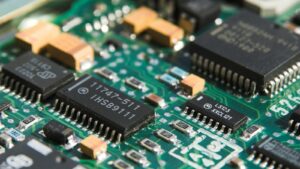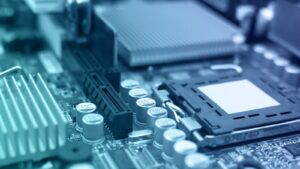”
Key Takeaways
- Critical Role: Computer hardware technicians are essential for diagnosing, repairing, and maintaining the functionality of various computer systems, making them integral to both personal and business environments.
- Growing Demand: The reliance on technology continues to grow, resulting in increasing demand for skilled technicians who can ensure optimal system performance and minimize downtime.
- Key Skills Required: Successful technicians need a blend of technical skills (like installation and troubleshooting) and soft skills (such as communication and problem-solving) to excel in their roles.
- Diverse Career Paths: There are numerous entry-level positions available, including help desk and technical support roles, which can lead to advanced career opportunities like network engineer or system administrator.
- Impact on User Experience: Technicians enhance user satisfaction by providing support and resolving hardware issues, ensuring a smooth interaction with technology for clients and colleagues.
- Continuous Learning: To thrive in this rapidly evolving field, technicians must stay updated on the latest technology trends and enhance their qualifications through certifications and education.
In today’s tech-driven world, computer hardware technicians play a crucial role in keeping systems running smoothly. These skilled professionals diagnose and repair hardware issues, ensuring that everything from personal computers to complex servers operates efficiently. With the rapid evolution of technology, their expertise is more valuable than ever.
As businesses and individuals rely heavily on technology, the demand for qualified technicians continues to grow. They not only fix problems but also help in upgrading and maintaining hardware, making them indispensable in various settings. Understanding the responsibilities and skills of a computer hardware technician sheds light on a career path that combines technical prowess with problem-solving abilities.
Computer Hardware Technician
Computer hardware technicians play a crucial role in maintaining and enhancing technology systems. Their work ensures that both personal and business hardware functions efficiently.
Definition And Role
 Computer hardware technicians specialize in diagnosing, repairing, and upgrading computer systems and components. They troubleshoot hardware malfunctions, install new equipment, and perform routine maintenance to extend system longevity. Technicians often collaborate with software professionals to resolve compatibility issues, ensuring seamless operation for users. Their expertise spans various hardware, including motherboards, processors, hard drives, and peripherals.
Computer hardware technicians specialize in diagnosing, repairing, and upgrading computer systems and components. They troubleshoot hardware malfunctions, install new equipment, and perform routine maintenance to extend system longevity. Technicians often collaborate with software professionals to resolve compatibility issues, ensuring seamless operation for users. Their expertise spans various hardware, including motherboards, processors, hard drives, and peripherals.
Importance In The Technology Field
Computer hardware technicians hold significant importance in the technology field due to several factors:
- System Performance: Technicians optimize hardware performance, which directly impacts overall system efficiency.
- Problem Resolution: Their diagnostic skills swiftly identify and rectify problems, minimizing downtime for users and businesses.
- Upgrades and Maintenance: Technicians facilitate necessary upgrades, enabling systems to remain current and effective.
- User Support: Technicians provide essential support to users, enhancing their experience and confidence in technology.
- Security and Reliability: Ensuring hardware security and reliability contributes to overall data protection and system integrity.
The growing dependence on technology underscores the essential contributions of computer hardware technicians, making their skills increasingly valuable in today’s landscape.
Skills And Qualifications Required
Computer hardware technicians require a combination of technical and soft skills to excel in their roles. These competencies enable them to effectively diagnose issues, perform repairs, and interact with clients or colleagues.
Technical Skills
- Knowledge of Computer Components: Familiarity with motherboards, processors, RAM, hard drives, and peripherals is vital.
- Troubleshooting Proficiency: Ability to identify and resolve hardware malfunctions through systematic analysis.
- Installation Skills: Competence in setting up and configuring various hardware components and systems.
- Operating System Familiarity: Understanding of different operating systems, including Windows, macOS, and Linux, to ensure compatibility with hardware.
- Network Setup and Management: Skills in configuring and managing local area networks (LANs) and understanding network hardware, including routers and switches.
- Safety Standards Knowledge: Awareness of proper safety and handling procedures to prevent damage to equipment and ensure personal safety.
- Testing and Diagnostic Tools: Proficiency in using diagnostic software and tools to assess hardware performance and reliability.
- Problem-Solving Ability: Strong analytical skills to evaluate complex issues and devise effective solutions quickly.
- Communication Skills: Clear communication for explaining technical problems to clients and collaborating with team members.
- Attention to Detail: Meticulous attention to identify small errors or potential problems during the repair process.
- Time Management: Capability to prioritize workload effectively, manage multiple tasks, and meet deadlines.
- Customer Service Orientation: Commitment to providing exemplary support and service to clients, enhancing overall satisfaction.
- Patience and Adaptability: Willingness to work through intricate problems and adapt to evolving technology and methods.
These skills form the foundation of a successful computer hardware technician’s career, enabling them to navigate the challenges of a rapidly changing technological landscape.
Daily Responsibilities Of A Computer Hardware Technician
Computer hardware technicians engage in various tasks daily that ensure the seamless operation of computer systems. Their work primarily revolves around diagnosing, repairing, and maintaining hardware components, which is essential in both personal and business environments.
Troubleshooting Hardware Issues
Technicians identify and analyze hardware malfunctions by using diagnostic tools and software. They perform systematic examinations of components, such as motherboards, power supplies, and storage devices. They create testing protocols that incorporate visual inspections and hardware stress tests. Technicians document their findings and provide solutions to restore functionality. They often collaborate with software engineers to resolve conflicts that may arise between hardware and software.
Installing And Configuring Hardware
Technicians are responsible for the installation of new hardware components. They ensure compatibility by verifying specifications and system requirements. They follow structured protocols for installing peripherals, such as printers and scanners, as well as internal components like RAM or graphics cards. Configuration tasks include setting up drivers and ensuring optimal performance settings. After installation, technicians conduct thorough testing to confirm proper functionality and connectivity, helping users maximize hardware capabilities.
Career Opportunities And Advancement
Computer hardware technicians enjoy diverse career opportunities with various paths for advancement. With growing technology reliance, professionals in this field can find numerous roles that match their skills and expertise.
Entry-Level Positions
 Entry-level positions serve as a gateway into the field for aspiring computer hardware technicians. Common roles include:
Entry-level positions serve as a gateway into the field for aspiring computer hardware technicians. Common roles include:
- Help Desk Technician: Provides initial support and troubleshooting for hardware issues to end-users.
- Technical Support Specialist: Assists customers with hardware and software concerns, often via phone or online chat.
- Field Service Technician: Travels to client sites to diagnose and repair hardware malfunctions on computers and peripherals.
These positions offer hands-on experience, exposing technicians to real-world scenarios and foundational skills essential for career growth.
Advanced Career Paths
Advanced career paths provide opportunities for specialization and leadership roles. Advanced positions include:
- Senior Hardware Technician: Oversees complex installations and repairs, mentoring junior staff and ensuring high-quality service.
- Network Engineer: Focuses on the design and maintenance of network systems, requiring comprehensive knowledge of hardware networks.
- System Administrator: Manages and supports the physical infrastructure of systems, blending hardware management with software and network skills.
Advancement in these roles often requires additional certifications or education, reflecting expertise in specific areas of technology, which can lead to higher salaries and increased job responsibilities.
Hardware Technician Is Indispensable
The role of a computer hardware technician is indispensable in the modern tech landscape. As technology continues to evolve, these skilled professionals are essential for ensuring that systems run smoothly and efficiently. Their expertise not only enhances system performance but also provides critical support to users and businesses alike.
With a blend of technical knowledge and soft skills, technicians are well-equipped to tackle a variety of challenges. The career paths available in this field offer numerous opportunities for growth and specialization. As reliance on technology increases, the demand for competent computer hardware technicians will only continue to rise, solidifying their importance in the industry.
“



